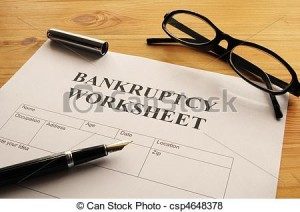- By: Cynthia Trimmer, Attorney

- You must respect the automatic stay. An automatic stay goes into effect immediately when an owner files a bankruptcy petition. The automatic stay prevents you from any attempt to collect debt accruing prior to the filing until the stay is lifted. This includes something as seemingly innocent as sending a past due statement. Mass mailings can also land you in hot water. There are strict penalties imposed for violation of the automatic stay, and the fact that you did not realize the owner filed bankruptcy does not relieve you from liability. It is therefore critical that your association and community association management firm have practices in place to ensure that bankruptcy accounts are immediately flagged and all collection activity is suspended.
- Bankruptcy does not automatically mean a debt is uncollectable. While all action must stop when an owner initially files, the fact that an owner has sought bankruptcy relief does not mean your debt is uncollectable. Standard discharge relieves an owner’s personal responsibility for paying the association, but does not affect the association’s lien. There are of course exceptions, but in most cases, an association’s lien passes through the bankruptcy proceeding unscathed. The key is knowing when and how you can proceed after bankruptcy is filed.
- Discharge does not mean the property is fair game. One of the primary goals of bankruptcy is to receive a discharge. When granted, the debtor is no longer legally required to pay debts that are discharged. That being said, the fact that discharge is granted does not mean the association can immediately foreclose. The property may still be considered part of the bankruptcy estate and additional steps may be required before collection efforts can proceed.
- Bankruptcy deadlines are not negotiable. There are no excuses for missing a deadline in the bankruptcy world – even when that deadline falls on a weekend. There may be severe consequences for failing to file the paperwork necessary to protect the association’s interest. Notably, you may be deemed to consent to a payment plan that is not sufficient to bring an account current, or may find that your claim is barred entirely. Do not let this happen to you. All mailings related to a bankruptcy should be sent to an attorney promptly.
- Surrender or abandonment in bankruptcy does not change title to property. Many owners believe they no longer own their property after surrendering or abandoning it in bankruptcy. This is not the case. Additional steps must be taken before title passes to a new owner. Consequently, owners usually remain liable for assessments accruing after the bankruptcy filing, and are still responsible for maintaining their property in accordance with your rules and regulations. The association, in turn, must still send mailings to the owner of record in order to comply with noticing requirements – just remember not to send any notices that would violate the automatic stay!
- No aspect of community association collections is shrouded in more mystery than bankruptcy. While not an area in which one should dabble, knowing a little about bankruptcy can help you understand an association’s rights and responsibilities and avoid the harsh penalties that arise when a bankruptcy stay is violated.
For more information or help dealing with bankruptcy, contact the attorneys at Ansbacher Law at 904-737-4600.
Jacksonville
8818 Goodby's Executive Drive
Suite 100
Jacksonville, FL 32217
500 3rd Street South
Jacksonville Beach, FL 32250
3509 U.S. Highway 17
Fleming Island, FL 32003
1650 US-1, #201
St Augustine, FL 32084
300 Colonial Center Pkwy
Suite 134,
Lake Mary, FL 32746
110 E Broward Blvd
Suite 1700,
Ft. Lauderdale, FL 33301
400 North Ashley Drive
Suite 1900
Tampa, FL, 33602
